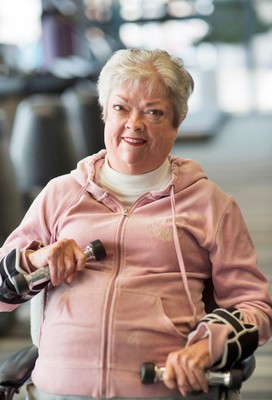For Leopold’s Lesley Beggs, a choice of support workers, going to the gym and visiting warmer climates are the best things about the National Disability Insurance Scheme (NDIS).
“I went up to Noosa for my 60th birthday last year for 10 days,” she said.
“Having the service provider and the NDIS both supporting that means I’m able to have a week’s holiday every year just like everyone else.”
Lesley, 60, has been in a wheelchair since her early teens after contracting a rare muscular skin disease.
But thanks to NDIS and great family support, her disability had not stopped her from enjoying a fulfilling life, she said.
In the early 80s, Lesley was Deakin University’s first graduate with a disability, completing a Bachelor of Arts (Education) and a Bachelor of Education with a major in psychology.
She retired three years ago after 29 years as a primary school teacher and has lived independently for most of her life, and has even skydived.
Lesley said being in a wheelchair or having a disability had never caused her as much stress as securing the right support workers.
“Prior to joining the NDIS in 2013, support services would send complete strangers to your home to provide your personal care.
“It didn’t matter if you weren’t compatible or whether that person had the right skills but now I can interview and employ the people who I’d like to provide my personal supports. It’s just a huge relief.”
Lesley now volunteers one day a week at Oberon Primary School, where she spent most of her teaching career, working with gifted children in grades three to six.
She has goals to volunteer at Vision Australia Radio reading the newspaper for people with visual impairments as well as finding a school in remote Australia where she can volunteer with indigenous children.
Lesley said she wouldn’t be able to live independently and be involved in her community without the NDIS-funded support workers who come to her house each morning to get her out of bed, showered and dressed.
She said that now she was retired, the benefit of the NDIS community access funding had become even more clear, allowing her to go to the gym weekly, go sailing with the Geelong Yacht Club’s Sailability program, and on trips to Melbourne.
“Now that I’ve transitioned from full time working life and I’m not getting that community interaction through my work, I didn’t realise just how valuable being able to get out and about was going to be,” Lesley said.
“I am quite self sufficient, but the fact that I can go sailing in the summer months and go to the gym and keep up a certain level of fitness is wonderful. In February this year, I even went on the Portarlington ferry over to Docklands and saw a musical in Melbourne.
“I have more of a social life now that I’m retired, but I’m able to get out and do those things with dignity and without the anxiety, because I’ve got someone with me who knows my routine and knows how I need things done for it to be a pleasant experience.”









